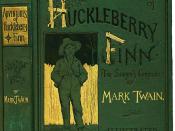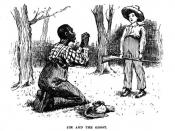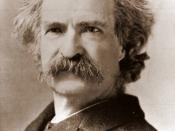Ashleigh Edwards
Mrs. Kahn
AP English
11.22.04
Censor Over Sense?
Books unravel wonderful stories of puzzling mysteries and lost loves. They share tales of thrilling adventures and gruesome murders. Public schools set curriculums for what genres and which specific novels children should be reading. These books contain valuable messages that the youth can learn life long lessons from while developing enhanced reading skills at the same time. Children gather many morals reading Mark Twain's novel, The Adventures of Huckleberry Finn. This novel provides the rousing story of Huck, an uncivilized twelve year old boy who runs away and encounters people from all walks of life while developing an unorthodox, though morally upright relationship with a runaway slave, all while enriching the lives and intellect of those who read it. These lessons are acquired both by directly reading the adventures in this book, but also in the process of retaining that information.
To be able to grasp Twain's novel, the students must comprehend the historical context and dialect used throughout the story, differentiating characters and their backgrounds. In addition, the curriculum needs to address, not disregard, the racism that allegedly exists in this novel. Lastly, children who read this novel will find examples of true friends and role models for their behavior. The Adventures of Huckleberry Finn should remain in the curriculum for eleventh graders.
Twain wrote a historically accurate novel, portraying the inequities of the South in the pre-Civil War era truthfully and more specifically, presenting variation in dialects to display the diversity Huck encountered. While reading The Adventures of Huckleberry Finn, students must learn to decipher a variety of different dialect characters used in the book. Before the novel even begins, Twain writes a note to the reader explaining his use of dialects, "In this book a...


